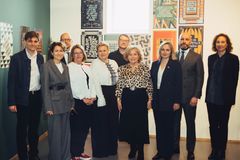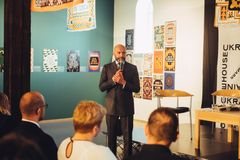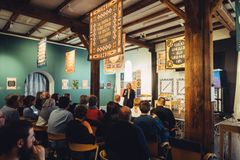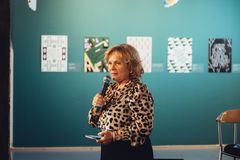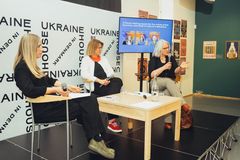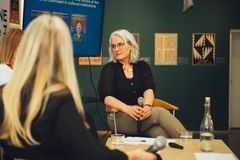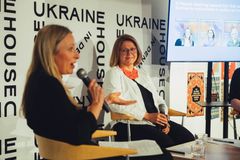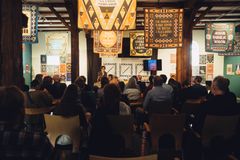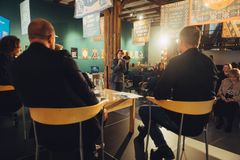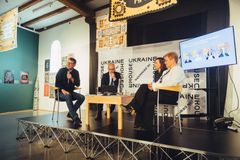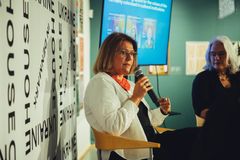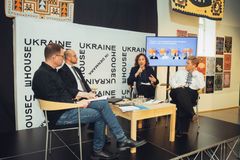II Forum “Decolonizing Mindsets for Security in Europe” Calls for Urgent Cultural Reframing to Strengthen Democracy
On April 25, Ukraine House in Denmark hosted the second edition of the Forum “Decolonizing Mindsets for Security in Europe,” convening leading cultural and political thinkers to examine how colonial legacies shape memory, policy, and Europe’s security landscape.
“At a time when cultural policy, memory, and history shape the global struggle for freedom and democracy, it's vital to reflect critically on the narratives that define how we see the US, Europe, Ukraine, and Russia. For Ukrainians, decolonisation means uncovering layers of russification and reclaiming our history, culture, and decision-making free from Russian-centric optics. But Ukraine’s security also depends on the willingness of democratic allies to emancipate themselves from cultural superpower biases—to recognise Ukrainian contributions to world heritage and engage with Ukraine as an equal partner in defending dignity and democracy. That’s why we will continue to foster dialogue around decolonizing mindsets—because only by making space for formerly oppressed voices can we build a truly secure common future,” said Nataliia Popovych, Chairperson of Ukraine House in Denmark, introducing the Forum's agenda in 2025.
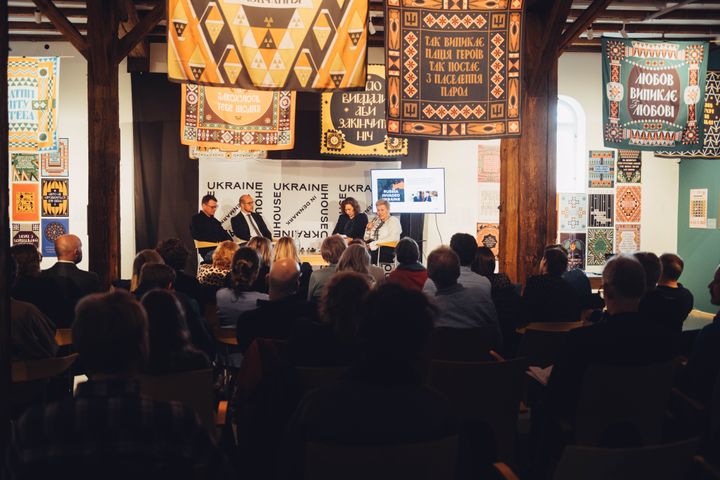
Opening remarks were delivered by H.E. Asta Radikaitė, Ambassador of Lithuania to the Kingdom of Denmark, and H.E. Andrii Yanevskyi, Ambassador of Ukraine to the Kingdom of Denmark. They both underlined the role of decolonization of memory and culture as essential pillars of European resilience against hybrid threats.
Following the welcoming addresses, Rasa Juknevičienė, Member of the European Parliament, offered a keynote speech framed around her initiative—the European Parliament Resolution on Russia’s Disinformation and Historical Falsification to Justify Its War of Aggression Against Ukraine. She emphasized that “this war is a continuation of Russia’s long standing colonial imperialistic policy” and underscored the importance of naming ideology as a root cause. Quoting directly from the resolution, she added: “The Russian regime denies Ukraine’s distinct national identity, falsely claiming it as part of the Russian world—a narrative rooted in imperialist ideology.” Juknevičienė noted this was the first time such language had been included in an official EU document, marking a pivotal shift in acknowledging the ideological underpinnings of Russian aggression.
The Forum’s first panel, "Uprooting the Colonial Gaze Within Your Cultural Optics", moderated by Søren la Cour Jensen (Chair of Blue Shield Denmark), featured rich interventions by experts.
Tetyana Filevska, Creative Director of the Ukrainian Institute, presented the newly developed Decolonization Guide for Museums. This comprehensive tool assists institutions in identifying and properly representing Ukrainian heritage within their collections. Filevska outlined five practical steps for decolonizing collections:
-
Learn about Ukraine and commit to change – cultivating the motivation to act.
-
Go through your collection and identify what needs attention – challenging misattributions to Russian or other cultures.
-
Change language and terminology – ensuring respectful and accurate descriptions.
-
Investigate provenance – the most complex but crucial step in restoring correct attribution.
-
Communicate with your audience – explaining why these changes matter for broader understanding.
She stressed that too often, museums misattribute Ukrainian cultural artifacts as Russian, reflecting entrenched colonial optics that must be challenged systemically. She also emphasised the importance of not divorcing culture from politics, and paying attention to the cultural dimension of Russian colonialism from a security perspective: “[In Ukraine] the [Russian] culture came before tanks”. Ms Filevska later added: the work on decolonising mindsets is a part of a general fight for truth at the moment. If the European views on Russia were decolonised and closer to the truth prior to the full-scale invasion, perhaps the armed support to Ukraine would have been more timely.
Frederik Rosén, Director of the Nordic Center for Cultural Heritage and Armed Conflict, expanded on how culture becomes a dimension of full-scale war. He reminded the audience of Ukrainian cultural heritage destruction as a dimension of Russia’s war. Mr Rosen also highlighted that in the current context "cultural policy is no longer neutral terrain" and can serve as both a battlefield and a shield in geopolitical conflicts. He also stressed the urgency for the European NATO members to form a clearer vision of culture as part of their security policies. This is since he presented plentiful evidence of heightened attention to culture as a critical dimension in Russian national security since the 2000s.
Dr. Julie Sissia from the Académie des Traces shared case studies from Western European museums and collaborations between France and Germany, showing how colonial-era collections require deep reconsideration, especially in the ways narratives of ownership and origin are constructed and presented.
The second panel, “Making Space for the Voices of the Formerly Colonized in Cultural Institutions,” moderated by Henriette Borg Reinholdt (Danish Cultural Institute), focused on the structural changes needed to ensure that cultural institutions and universities integrate formerly marginalized narratives. The obstacles such institutions face in this process were also discussed in detail.
Kateryna Botanova, cultural critic and curator, spoke about ways in which Western cultural institutions often reinforce hierarchies by upholding colonial narratives. She explained that true decolonization is not merely about inviting diverse voices into existing structures but is tied to changing the very systems that historically excluded those voices, and creating forms of positive discrimination. Ms Botanova emphasized that Russian cultural dominance operates through maintaining inequality — calling itself “great Russian culture”, thus elevating one culture and systematically diminishing others. Furthermore, she spoke about the examples of “opposition” Russian culture makers capitalising on the pain endured by the Ukrainian nation in the context of epistemic violence, as they are exploiting the Western institution’s tendencies to use their voices, instead of the lesser known voices of the Ukrainians, in discussing Russian Ukrainian war. She called on Western cultural institutions to rethink their foundational frameworks to address these embedded imbalances within their teachings and presentations. Ms Botanova also called on the cultural institutions to reflect on their openness to new and lesser known voices and take more risks in that regard by making real space for the voices of the formerly colonised by conducting translation schools and courses, translating new authors, and bringing more guest speakers to the existing courses.
Annika Hvithamar, Head of the Institute of Regional and Cross-Cultural Studies at the University of Copenhagen, addressed how academic environments also perpetuate colonial hierarchies, often unconsciously. She reflected on the underfunding of the language and regional studies departments as a major barrier to including the voices of the colonised, as well as the lack of trained translators for books and publications from the languages of the colonised. Ms Hvithamar also underlined the way Ukrainian studies have historically been treated within European academia, frequently framed as a subset of Russian studies. She explained that such academic structuring itself carries a colonial legacy that urgently needs to be dismantled and provided examples of how currently the scholars in her department are working with this challenge. She argued that true academic decolonization involves recognizing Ukraine—and similarly marginalized cultures—as independent historical and cultural actors in their own right. Furthermore, an issue lies in the colonial legacy of European institutions themselves: recognising Russian colonial influences is able to trigger uncomfortable discussions domestically.
The discussion highlighted that genuine decolonization in education and culture is not about superficial diversity initiatives. It requires deep structural changes: reassessing who tells the stories, whose perspectives are prioritized, and how institutions are organized to reflect a truly inclusive, equitable vision of culture and history. Moreover, in discussions with the audience, practical suggestions on starting with those changes were made, including educational trips of young Western academics and cultural professionals to countries of the formerly colonised to raise scholarly and cultural interest.
The II "Decolonizing Mindsets for Security in Europe" Forum was organised by Ukraine House in Denmark in collaboration with: Ukrainian Institute, Danish Cultural Institute, Nordic Center for Cultural Heritage and Armed Conflict, Institut français du Danemark, University of Copenhagen, Open Society Foundation, Politiken Foundation, Blue Shield Denmark, and the Embassy of Ukraine in the Kingdom of Denmark. We thank our partners for their commitment and support.
As the forum made clear, cultural decolonization is no longer optional—it is central to building a more resilient, democratic Europe. Ukraine House in Denmark remains committed to advancing this dialogue through inclusive platforms and partnerships across the continent.
Keywords
Images
About Ukraine House
The Ukraine House in Denmark is a civil society organisation of Ukrainian cultural diplomacy based in Copenhagen. Its mission is to form an enduring positive influence of Ukraine on Ukrainian-Danish cooperation, security, and lasting peace in Europe.
Subscribe to releases from Ukraine House in Denmark
Subscribe to all the latest releases from Ukraine House in Denmark by registering your e-mail address below. You can unsubscribe at any time.
Latest releases from Ukraine House in Denmark
Post-Release: Myroslav Marynovych om mod, samvittighed og konfrontationen med nutidens Rusland6.10.2025 10:45:03 CEST | Pressemeddelelse
København, Danmark – Den 5. september havde Ukraine House i Danmark den ære at være vært forMyroslav Marynovych, en vigtig dissident, medstifter af den Ukrainske Helsingforsgruppe, Gulag-overlever og prorektor ved det Ukrainske Katolske Universitet. Arrangementet kastede lys over modet hos Ukraines menneskerettighedsforkæmpere i 1960’erne og 70’erne – en generation, der modsatte sig den sovjetiske totalitære maskine, på et tidspunkt hvor næsten ingen troede, det var muligt.
Ukraine House in Denmark Hosts Debate on the End of Russian Colonialism1.10.2025 08:00:00 CEST | Pressemeddelelse
Copenhagen, September 22, 2025 — Ukraine House in Denmark, together with the Danish Foreign Policy Society and the Free Nations of Post-Russia Forum, convened a high-level discussion on the end of Russian colonialism. The event brought together international experts, policymakers, and civil society leaders to examine Russia’s imperial decline and the urgent need to prepare for its consequences. Moderated by Nataliia Popovych, Chairperson of Ukraine House in Denmark, the panel featured Charlotte Flindt Pedersen (Danish Foreign Policy Society), Jacob Kaarsbo (Intelligence and Security Analyst), Juraj Mesík (Slovak Foreign Policy Association), Yaroslav Yurchyshyn (Member of the Ukrainian Parliament), Oleg Magaletskyi (Free Nations of Post-Russia Forum), and Mette Skak (Scholar on Russian foreign and security policy).
Post-Release: Myroslav Marynovych on Courage, Conscience, and Confronting Today’s Russia30.9.2025 14:09:02 CEST | Pressemeddelelse
Copenhagen, Denmark – On 5 September, Ukraine House in Denmark was honored to host Myroslav Marynovych, a keystone dissident, co-founder of the Ukrainian Helsinki Group, Gulag survivor, and Vice-Rector of the Ukrainian Catholic University. The event shone a light on the courage of Ukraine’s human rights defenders in the 1960s and 70s, a generation that resisted the Soviet totalitarian machine when almost no one believed it was possible.
How Ukraine’s Da Vinci Wolves Are Rewriting the Rules of War: Military Tech Discussion at Ukraine House in Denmark9.9.2025 08:00:00 CEST | Pressemeddelelse
Copenhagen, Denmark — August 22, 2025. At Ukraine House in Denmark, soldiers, engineers, and policymakers gathered to share the lessons of a war where milltech drones and robots, and artificial intelligence have moved from theory to daily reality in Ukraine. Organized by the Defence Robotics, a charity foundation, the discussion brought together Oleksandr Yabchanka, Head of the Robotic Systems Service of the Da Vinci Wolves battalion, alongside innovators from companies Frontline and Tencore, two of Ukraine’s leading developers of ground robotic platforms.
Ukraine House in Denmark Opens “Uncurtained: Ukrainian Art in Danish Collections 1989–2023”1.9.2025 08:00:00 CEST | Nyhed
Copenhagen, August 21, 2025 – Ukraine House in Denmark proudly opened “Uncurtained: Ukrainian Art in Danish Collections 1989–2023”, its 11th major exhibition and a landmark research project tracing 35 years of cultural exchange between Denmark and Ukraine. Curated by Kateryna Stukalova, the exhibition brings together over 100 works by 28 Ukrainian artists. In her opening remarks Nataliia Popovych, chairperson of Ukraine House in Denmark, emphasized: “Uncurtained is not just an exhibition — it is a journey through thirty-five years of trust, of Ukrainian art being seen, collected, and preserved in Denmark. Long before the world spoke of the ‘Danish model’ of support for Ukraine, Danish curators, collectors, and institutions chose to trust in Ukrainian creativity — to see our culture as sovereign and distinct. Opening on the eve of Ukraine’s Independence Day, this exhibition stands as a tribute not only to our artists, but to the very idea of independence — a daily choice to defend cultu
In our pressroom you can read all our latest releases, find our press contacts, images, documents and other relevant information about us.
Visit our pressroom
